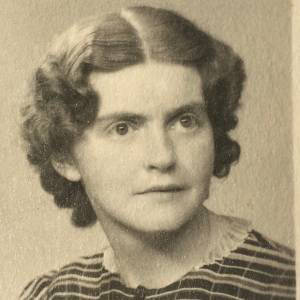Lorna's father Albert: civilian & military career
Here is another photo of Lorna’s father Albert. Here he is on the Isle of Wight in 1924 or 1925, when he was in his early 40s. The photo was taken a decade and a half before Albert joined the war effort in 1940, as reported by Lorna on 7th May 1940 (see the blip of the same date in 2020).
Recently we have spent some time hunting through public records hoping to find further information about Lorna’s father’s career (both military and civilian) from the date of Lorna's birth in 1914. This has helped us to piece together a timeline for Lorna up until the point that she embarked on writing her war diary. Some of the detail of Lorna’s father’s Middle East service related to his shock return on 21st November 1940 comes from these records, and is also elaborated below.
Where did Lorna live?
Filton, Bristol: 1914 to 1918
Lorna was born in Filton, Bristol. It looks like the family probably lived there until the end of World War I while Lorna’s father was on active service in the Army Service Corps. Wartime medical records show that by March 1918 (when being treated for amnesia) Lorna’s 37 year old father had provided military service for three and half years, most of it (39 months) in the field. This included participation in the Battle of Messines in 1917 (see his account blipped on 3rd February 2020). We have also previously noted that Lorna’s father was mentioned in despatches three times during World War I (see the blip of 19th January 2020).
Stirling: 1918 to 1919 (probably - but could be as late as 1922)
By the end of 1918, the family had moved to Stirling. We know this from several family photographs previously blipped in this journal, and a reference for Lorna’s father written by the Lieutenant Colonel of the Royal Army Service Corps Highland District in December 1918 (blipped on 4th June 2020). From records in the London Gazette we have recently learnt that Lorna’s father completed his service in the army on 9th June 1919. It is on this basis that we believe that the family probably left Stirling that year.
Ilford: 1919 (possibly, but could be later) to 1924
From a hand-written record referring to the issue of Lorna’s father’s World War I medals, as well as photographs that we have previously blipped in this journal, we know that the family was definitely living in Ilford by summer 1922. We have also found a reference in the London Gazette to a person of Lorna’s father’s name who sold a Bermondsey-based foundry in 1921. Could this have been Lorna’s father’s business to which he commuted from Ilford? This would make sense given his later career as an iron and steel merchant in Sheffield, and his work in the Middle East during World War II for which he was awarded an MBE (see below). If so, Lorna and her family might have moved directly from Stirling to Ilford. If not, our guess is that first they all returned to the south west of England. Perhaps there they lived on their ‘private means’ for a period, as Lorna’s parents had done when newly married - see the blip of 13th June 2020.
Sheffield: 1925 to 1933
The last photographs of Lorna in Ilford are from 1924, and the first in Sheffield are from 1925, so we can date Lorna’s next move with her family with relative certainty. Lorna’s father was an iron and steel merchant in Sheffield until he sold his business in 1935.
Cambridge: 1933 to 1936
Lorna left home to study English at Girton College, Cambridge between 1933 and 1936.
Stourbridge: 1936 to 1937
Lorna’s first job was as a part-time English mistress at the County High School in Stourbridge. We know this from records held at Girton College.
Bath: 1937 to 1939
The Girton records also reveal that Lorna worked as the Second Assistant English Mistress at the Royal School, Bath.
Malvern: 1939 onwards
Lorna records her address as her parents’ house in Malvern at the start of her war diary entries. We believe that her parents moved there some time around/after 1935 having sold the business in Sheffield.
What was Lorna’s father doing during the war in the Middle East?
Lorna’s father was awarded the MBE in 1943. The citation for his honour refers to service in the Middle East that began in March 1941 (i.e. four months after Lorna noted his shock return home on 21st November 1940). He joined the East African campaign, which ran from June 1940 to September 1943, as a Salvage Control Officer in Eritrea*. There he was responsible for organising the collection and sorting of vast quantities of scrap metals captured after the retreat of the Italian forces, and shipping 4200 tons of it (presumably back to the UK). One of his ‘outstanding merits’ is that he discovered ’26 tons of valuable magnesium alloy which, in the form of bomb fins, had been distributed to Italian residents at Gura**, probably with view hiding them, for use as flowerpots’.
Before we started blipping Lorna’s war diary we knew that her father had dealt in scrap metal during World War II. It was very satisfying to uncover this citation a couple of weeks ago, and to be able to add more details to this part of Lorna's story.
* https://en.wikipedia.org/wiki/East_African_campaign_(World_War_II)#Eritrea
** https://en.wikipedia.org/wiki/Gura,_Eritrea#20th_century
- 22
- 0

Comments
Sign in or get an account to comment.


